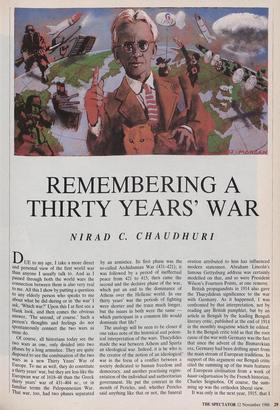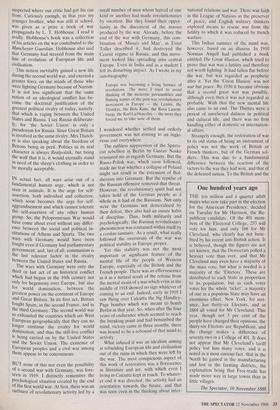REMEMBERING A THIRTY YEARS' WAR
NIRAD C. CHAUDHURI
DUE to my age, I take a more direct and personal view of the first world war than anyone I usually talk to. And as I passed through both the world wars the connection between them is also very real to me. All this I show by putting a question to any elderly person who speaks to me about what he did during or in 'the war' I ask, 'Which war?' Upon this I at first see a blank look, and then comes the obvious answer, 'The second, of course.' Such a Person's thoughts and feelings do not spontaneously connect the two wars as mine do.
Of course, all historians today see the two wars as one, only divided into two Phases by a long armistice. They are quite disposed to see the combination of the two wars as a new Thirty Years' War of Europe. To me as well, they do constitute a thirty years' war, but they are less like the European war of 1618-48 than the Greek thirty years' war of 431-404 BC, or in familiar terms the Peloponnesian War. That war, too, had two phases separated by an armistice. Its first phase was the so-called Archidamian War (431-421); it was followed by a period of ineffectual peace from 421 to 415; then came the second and the decisive phase of the war, which put an end to the dominance of Athens over the Hellenic world. In our thirty years' war the periods of fighting were shorter and the truce much longer, but the issues in both were the same — which participant in a common life would dominate that life?
The analogy will be seen to be closer if one takes note of the historical and polem- ical interpretation of the wars. Thucydides made the war between Athens and Sparta an ideological war. Indeed, it is he who is the creator of the notion of an ideological' war in the form of a conflict between a society dedicated to human freedom and democracy, and another practising regim- entation of the individual and authoritarian government. He put the contrast in the mouth of Pericles, and, whether Pericles said anything like that or not, the funeral oration attributed to him has influenced modern statesmen. Abraham Lincoln's famous Gettysburg address was certainly modelled on that, and so were President Wilson's Fourteen Points, at one remove.
British propagandists in 1914 also gave the Thucydidean significance to the war with Germany. As it happened, I was confronted by that interpretation, not by reading any British pamphlet, but by an article in Bengali by the leading Bengali literary critic, published at the end of 1914 in the monthly magazine which he edited. In it the Bengali critic told us that the root cause of the war with Germany was the fact that since the advent of the Bismarckian era, Germany had been drifting apart from the main stream of European traditions. In support of this argument our Bengali critic cited the summing up of the main features of European civilisation from a work of haute vulgarisation by the French historian, Charles Seignobos. Of course, the sum- ming up was the orthodox liberal view.
It was only in the next year, 1915, that I suspected where our critic had got his cue from. Curiously enough, in that year my younger brother, who was still at school, was given as a prize a book of war propaganda by L. T. Hobhouse. I read it avidly. Hobhouse's book was a collection of his articles on the war contributed to the Manchester Guardian. Hobhouse also said that Germany had strayed from the main line of evolution of European life and civilisation.
This notion inevitably gained a new life during the second world war, and exerted a greater force on the minds of those who were fighting Germany because of Nazism. It is not less significant that the same notion of an ideological conflict has be- come the doctrinal justification of the greatest political rivalry of today, namely, that which is raging between the United States and Russia. I say Russia deliberate- ly, for 'the Soviet Union' is only a Pseudonym for Russia. Since Great Britain IS involved in the same rivalry, Mrs Thatch- er is also speaking about the freedom of Britons being in peril. Politics in its real character is always Realpolitik, but being the wolf that it is, it would eternally stand in need of the sheep's clothing in order to be morally acceptable.
IN actual fact, all wars arise out of a fundamental human urge, which is not seen in animals. It is the urge for self- assertion, both individual and collective, which soon becomes the urge for self- aggrandisement and which cannot tolerate the self-assertion of any other human group. So, the Peloponnesian War would have come about even without any differ- ence between the social and political in- stitutions of Athens and Sparta. The two wars with Germany would have been fought even if Germany had parliamentary government; and, last of ail, communism is the last relevant factor in the rivalry between the United States and Russia.
The wars with Germany were only the third or last act of an historical conflict Which had begun in the 16th century not only for hegemony over Europe, but also for world domination, between the greatest power on the continent of Europe and Great Britain. In its first act, Britain fought Spain, in the second France, and in the third Germany. The second world war so exhausted the countries which are West European geographically that they can no longer continue the rivalry for world domination, and thus the still-live conflict IS being carried on by the United States and the Soviet Union. The existence of European peoples and a civil war among them appear to be coterminous.
BUT none of this nor even the possibility of a second war with Germany, was fore- seen in 1919. I distinctly remember the Psychological situation created by the end of the first world war. At first, there was an outburst of revolutionary activity led by a small number of men whom hatred of one kind or another had made revolutionaries by vocation. But they found their oppor- tunity in the discontent of the masses produced by the war. Already, before the end of the war with Germany, this com- bination of 'Masses and Man', as Ernst Toiler described it, had destroyed the Czarist regime in Russia, and this move- ment looked like spreading into central Europe. Even in India and as a student 1 felt its disturbing impact. As I wrote in my autobiography:
Europe was becoming a living furnace of revolutions. The more I tried to avoid thinking of the meteoric personalities and flaming names of the post-war revolutionary movement in Europe — the Lenins, the Trotskys, the Bela Kuns, the Rosa Luxem- burgs, the Karl Liebknechts — the more they forced me to take note of them.
I wondered whether settled and orderly government was not coming to an inglo- rious end everywhere.
The ruthless suppression of the Sparta- cist rebellion in Berlin by Gustav Noske reassured me as regards Germany. But the Russo-Polish war, which soon followed, made me fear whether a collapse of Poland might not result in the extension of Bol- shevism into Germany. But the repulse of the Russian offensive removed that threat. However, the revolutionary spirit had not taken hold of the German people as a whole as it had of the Russians. Not only were the Germans not demoralised by their defeat, they also had an innate habit of discipline. Thus, both militarily and psychologically, the Russian revolutionary phenomenon was contained within itself by a cordon sanitaire. As a result, what really followed the overstrain of the war was political stability in Europe proper. Yet this stability was not the most important or significant feature of the mental life of the people of Western Europe, especially of the British and the French people. There was an effervescence in it as a natural result of the release from the mental strain of a war which even in the middle of 1918 showed no sign whatever of coming to an end. Indeed, early in 1919 I saw flying over Calcutta the big Handley- Page bomber which was meant to bomb Berlin in that year. So, when after the four years of endurance which seemed to reach the breaking point and had benumbed the mind, victory came in three months, there was bound to be a rebound of that mind to activity. What infused it was an idealism aiming at rebuilding European life and civilisation out of the ruins in which they were left by the war. The most conspicuous aspect of this work of restoration was a florescence in literature and art, with which even I living in Calcutta kept in touch. To whatev- er end it was directed, the activity had an orientation towards the future, and that was seen even in the thinking about inter-
national relations and war. There was faith in the League of Nations as the preserver of peace, and English military thinkers explored means to rescue war from the futility to which it was reduced by trench warfare.
This Indian summer of the mind was, however, based on an illusion. In 1910 Norman Angell had published a book entitled The Great Illusion, which tried to prove that war was a futility and therefore not worth fighting. It had fallen flat before the war, but was regarded as prophetic after it. Yet the 'Great Illusion' was not war but peace. By 1930 it became obvious that a second great war was possible, although even then it was not regarded as probable. With that the neW mental life also came to an end. The Thirties were a period of unrelieved dulness in political and cultural life, and there was no firm handling either of domestic or internation- al affairs.
Strangely enough, the restoration of war to its old status of being an instrument of policy was not the work of British or French thinkers, but of the German sol- diers. This was due to a fundamental difference between the reaction of the victors to the war they had won, and that of the defeated nation. TO the British and the
French people, the war left as its psycholo- gical legacy, not elation of victory, but an unconquerable revulsion from the idea of war. In stark contrast, the Germans were left with a rankling sense of grievance, which blocked the development of any kind of anti-war thinking and feeling. The Germans thought that the wrongs which had been inflicted on them could be redressed only by war, a second war which could be made successful by avoiding the military mistakes of the first. So, as soon as the new regime became stable in Germany with the Dawes Plan and Locarno, Ger- man soldiers resolutely set about to rebuild the German army and arrive at tactical methods which would prevent a stalemate and restore strategic freedom to war. Ironically, they were helped in their new military thinking by two English military writers: J. F. C. Fuller and B. H. Liddell Hart, whom orthodox British soldiers tre- ated with indifference and even disdain. The German organisation and tactical methods made the second world war every- where a war of movements.
But even when by the middle Thirties a war of 'revenge by Germany became a recognised possibility and also probability, there was an ineradicable feeling against war among the British people and British politicians. Without that there would not have been a second world war, and what is now regarded as a thirty years' war would not have come about.
Moreover, when the war was forced on the British people by Germany, there was no clear idea of its character and purpose. I cannot still now discover what rational ideas about carrying it on and ending it the British Government had in 1939. That absence of a clear sense of purpose made the war from October 1939 to April 1940 what it was called — the 'Phoney War'. For the British people, the war became pur- poseful only when they had to fight for survival. They fought it then as they should have fought it from the beginning, had they realised that it was a resumption of the war of 1914-18, which had only been broken off by a truce. And even the survival was achieved by the attack of Germany on Russia and the attack on the United States by Japan, none of which could be foreseen in 1940 and were basically irrational.
Thus it was logical that the United States and the Soviet Union should be the real victors in the second world war and that the future of the entire world would be in their hands. For the British people there could be and has been only survival fol- lowed by the natural consequences of mere survival; that is, total absorption in life from day to day, accompanied by a blissful forgetfulness of the past and the future. Butthis anticlimax to the greatest war the British people have fought in their entire history can be clearly perceived only by those who, like me, have lived through the entire span of the 20th century unfolded so far.












































































 Previous page
Previous page